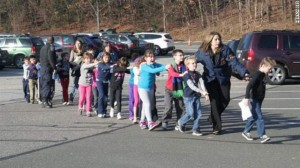
Save the Children issued a statement sharing how extremely saddened by the events in Newtown, which is only 20 miles from its Westport, Conn. headquarters. They have offered the local authorities and partners assistance as needed. For now, the international humanitarian and development organization is running a Child Friendly Space in Newtowns Reed Intermediate School, which takes graduates of the Sandy Hook Elementary School where the tragedy occurred.
Save the Children has opened a Child Friendly Space in a Newtown, Conn. middle school to give local children a safe place to play and express themselves while their parents seek counseling and support in connection to the horrific tragedy in their community.
The agency has designed Child Friendly Spaces based on decades of experience protecting children during times of crisis and helping them recover from disaster, crisis and emergencies all over the world. They have also developed guidance to help children who may be exposed to indirect effects of a crisis.
Right now, parents, teachers, grandparents and other caregivers are very concerned about how dramatic images of and discussion about the tragic events can affect the emotional well-being of their children and are looking for advice. Save the Children offers the following 10 tips for adults to support children through any disaster, emergency or crisis.
Save the Children recommends parents, teachers, grandparents and caregivers:
1. Limit television time. While it can be important for adults to stay informed about the situation, television images and reports may be confusing and frightening for children. Watching too many television reports can overwhelm children and even adults. So, limit the number of television reports about the situation you and your children watch.
2. Listen to your children carefully. Try to find out what your child knows and understands about the situation before responding to their questions. Children can experience stress when they do not understand dangerous experiences. Find out what your child knows about the crisis. Then, talk to your child to help him or her understand the situation and ease their concerns.
3. Give children reassurance. Tell children that adults are doing everything they can to protect and help children who have been affected by the tragedy. Also, let them know that if an emergency happens, your main concern would be their safety. Make sure they know they are being protected.
4. Be alert for significant changes in behavior. Caregivers should be alert to any significant changes in childrens sleeping patterns, eating habits, and concentration levels. Also watch for wide emotional swings or frequent physical complaints. If any of these actions do happen, they will likely lessen within a short time. If they continue, however, you should seek professional help and counseling for the child.
5. Understand childrens unique needs. Not every child will experience a disaster in the same way. As children develop, their intellectual, physical and emotional abilities change. Younger children will depend largely on their parents to interpret events; older children and adolescents will get information from various sources, such as friends and the media. Remember that children of any age can be affected by a disaster. Provide them all with love, understanding and support.
6. Give your children extra time and attention. Children need close, personal attention to know they are safe. Talk, play and, most importantly, listen to them. Find time to engage in special activities with children of all ages.
7. Be a model for your children. Your children will learn how to deal with these events by seeing how you respond. The amount you tell children about how youre feeling should depend on the age and maturity of the child. You may be able to disclose more to older or more mature children but remember to do so calmly.
8. Watch your own behavior. Make a point of being sensitive to those impacted by the crisis. This is an opportunity to teach your children that we all need to help each other.
9. Help your children return to a normal routine. Children usually benefit from routine activities such as set eating times, bed time, and playing with others. Parents should make sure their children’s school is also returning to normal patterns and not spending a lot of time discussing the disaster.
10. Encourage your children to do volunteer work. Helping others can give children a sense of control and security and promote helping behavior. During a disaster, children and adolescents can bring about positive change by supporting those in need
Save the Children is an independent organization that creates lasting change for children in need in the United States and around the world. You can follow them on Twitter and Facebook.








